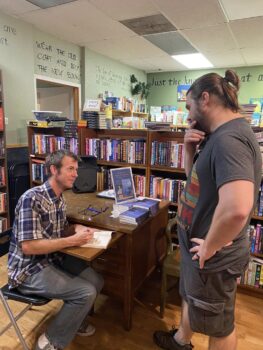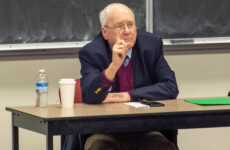
The cover of English Professor Marc Dickinson’s book, “Replacement Parts.”
Ankeny DMACC English Professor Marc Dickinson published his first book, “Replacement Parts” on Sept. 24, 2024.
Dickinson said the book focuses on multiple characters in a small fictional town called Dexton, Iowa. Each character tries to overcome the challenges of living in this small town and the obstacles that come from circumstances in their lives.
That is also how the book got its name. Each character is trying to replace the brokenness and loss in their life with something else.
Even though the characters in “Replacement Parts” are from the same town and are similar in the sense that they are each overcoming different challenges, Dickinson did not intentionally create them that way for the book. In fact, according to Dickinson, each story in the book was created separately, over about fifteen years.
“I wrote all these different stories, separately on their own time. It wasn’t until I started putting the collection together that I actually had a friend, a workshop partner, who was like, ‘You know, I see a lot of connections that are happening in these stories,’” Dickinson said. His friend pointed out that even though the characters were different, their lives all took place in a small town.
Dickinson said that over time, they started finding links between each of the characters and the whole world that they were in. “It’s not just a collaboration of random stories. It’s a collaboration of linked stories,” Dickinson said.
Dickinson said it is important that readers keep in mind that the book is not just filled with random stories. Each story is connected to another, and readers should pay attention to those connections.
Despite “Replacement Parts” being a collection of short stories, the stories’ connections make the book feel like a novel. Some characters will pop in one story and then a few stories later, they will show up again. Readers will be able to see some characters in the book grow up and transform throughout the book.
Each of the characters in Dickinson’s book experiences a struggle they must overcome. According to Dickinson, those struggles often deal with their identity. Dickinson said that he tried to center those struggles around a transformative moment in their life that is meaningful to them.

DMACC English Professor Marc Dickinson at a book signing event at Beaverdale Books. Photo provided by Beaverdale Books.
When asked which character he resonates with the most, Dickinson mentioned a little boy and a girl named Hannah who he has starting and ending the book. He resonates with the boy because he is a father and appreciates the boy’s point of view of life in the book.
“Some of these stories are gritty, some of them are a little… heartbreaking. I just love the joy of his point of view, this kind of innocent point of view, while he’s dealing with real-life issues,” Dickinson said.
Even more than the boy, Dickinson resonates with Hannah because, at the beginning of the book, she is trying to figure out who she is and find her way after the passing of her parents. When readers get to the end of the book, they see that Hannah has found her way and figured out who she is.
Dickinson said that he has always had a passion for short stories but what sparked him to write this book goes back to DMACC. When he first began teaching, he started at the campus in Newton, Iowa. During his time there, Maytag closed in Newton, leaving all of the factory line workers out of a job.
However, each worker was given a scholarship to go back to college and get an education, so that they could build themselves a better life. Dickinson said that at first, it was intimidating being a new teacher with older factory workers but it was inspiring because they were proud to be in college.
Finding inspiration from this experience as a young teacher was not difficult for Dickinson. “I always found my way back into these small-town stories and really tried to humanize that small-town experience away from the stereotype that we often think about with small towns or the working poor,” he said.
Before that, Dickinson also said, “I was trying to think about the working-class life, the rural life… they feel replaceable, and maybe they feel voiceless in the world. So, my job is to really give a voice to that.”
As far as what message he wants readers to walk away with from the book, Dickinson said that he does not want to dictate that too much but he does want them to feel like they have read something that speaks to them in their life. He said that he would love for readers to know what happens in Iowa and see how it is more complex and interesting than people in Iowa like to think it is.





Comments